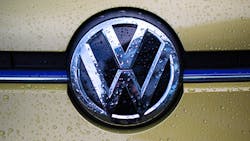Pollution from 2.6 million Volkswagen cars sold in Germany between 2008 and 2015, rigged to appear eco-friendly, will cause 1,200 premature deaths in Europe, according to a study of the fraud’s health impacts released Friday.
“The researchers estimate that 1,200 people in Europe will die early, each losing as much as a decade of their life, as a result of excess emissions generated,” said the Massachusetts Institute of Technology, which took part in the study.
This corresponded to about 1.9 billion euros in health costs and lost labor productivity, the paper said. Germany will account for about 500 lives lost, only 40% of the projected European toll, according to findings published in the journal Environmental Research Letters.
Poland is in second place with 160 deaths, followed by France with 84, the Czech Republic with 72, Italy 55, Austria 47, Switzerland 40, Hungary 32, Britain 30 and Romania 27.
The same researchers had previously estimated that excess emissions from 482,000 Volkswagens sold in the United States in the same period would cause 60 premature American deaths.
Volkswagen admitted in 2015 to having installed software in 11 million diesel engines worldwide to circumvent emissions tests. This was to make the cars seem compliant with pollution limits while in fact they were emitting health-harming pollutants.
In Germany, 2.6 million rigged Volkswagens were sold under the brands VW, Audi, Skoda and Seat, said the researchers — a fifth of the country’s total diesel fleet. Diesel cars emit nitrogen oxides, or NOx — poisonous gases that contribute to acid rain and combine with ammonia to create particles that can penetrate deep into the lungs and cause cancer, chronic breathing problems and premature death.
Air pollution “doesn’t care about political boundaries; it just goes straight past,” said study co-author Steven Barrett of MIT. “Thus a car in Germany can easily have significant impacts in neighboring countries, especially in densely populated areas such as the European continent.”
If Volkswagen were to recall and retrofit all affected German-sold vehicles by the end of 2017, “this would avert 2,600 additional premature deaths and 4.1 billion euros in corresponding health costs,” the study authors said.
In 2012, the World Health Organization’s cancer research agency classified diesel engine exhaust as cancer-causing. The European Environment Agency estimates that more than 400,000 people die prematurely every year due to outdoor air pollution in urban Europe — about half of it from traffic emissions.
Volkswagen’s rigged cars emitted NOx at levels that were on average four times the European limit, said the MIT statement.
The researchers combined data on Volkswagen emissions, how far and often Germans drive their cars, and pollution-impacting weather phenomena such as wind and rainfall. They produced a map of pollution which they overlaid on population density charts of Europe. With these, they calculated Europeans’ exposure to German-derived excess emissions from the Volkswagen deceit, and their increased risk of premature death.
“It ends up being about a one percent extra risk of dying early in a given year, per microgram per meter cubed of fine particles you’re exposed to,” Barrett explained. ”Typically, that means that someone who dies early from air pollution ends up dying about a decade early.”
Excess emissions are calculated as the difference between the limits set by European authorities and actual pollution that took place under the fraud.
The Climate Action Network, an NGO grouping, said the study was a mere hint at the true extent of health consequences of what has become known as dieselgate.
“Dieselgate was not limited to Volkswagen,” it said in a statement, and called for the creation of an independent European agency to oversee the sector.
By Mariëtte Le Roux
Copyright Agence France-Presse, 2017
About the Author
Agence France-Presse
Copyright Agence France-Presse, 2002-2025. AFP text, photos, graphics and logos shall not be reproduced, published, broadcast, rewritten for broadcast or publication or redistributed directly or indirectly in any medium. AFP shall not be held liable for any delays, inaccuracies, errors or omissions in any AFP content, or for any actions taken in consequence.
